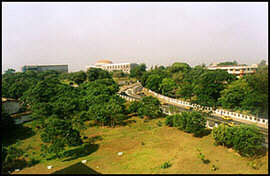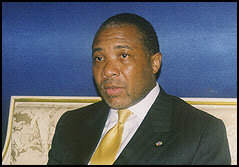 ECONOMY & BANKING SYSTEM ECONOMY & BANKING SYSTEM |
 Economy Economy |

Liberia has a legacy from the past of a very strong private sector driven by the Open Door Policy that lays the country bare in an investor-friendly environment. Many would-be investors have not had reasons to turn their backs on the numerous opportunities to do real profit-making business in an atmosphere unparalleled in many developing countries.
"There are no limits placed on repatriation of one's profits. We have very, very long-term investment incentives as far as interest rates and how profits are applied back into the economy. They are very liberal. So you can invest in Liberia, repatriate your profits without the harassment you would find in other countries," H.E. Dr. Charles Ghankay Taylor, President of the Republic of Liberia, assures.

For more than half a century, Liberia has operated a "dollarized economy" where the USD is legal tender along side the Liberian dollar leaving the dynamics of the market forces to determine the rates of exchange. For the past three years, the rate has fluctuated between Liberian dollars 38 - 43 to 1USD.
By 1987, the country's Gross Domestic Product (GDP) of US$1,141million began plummeting owing to persistent low or negative growth rates mostly attributed to periods of socio-political upheavals in the country.
"Luckily for Liberia, perhaps unlike other countries, because we are a dollarized economy, because we are an open economy, we still have flows coming in, so we don't have any problems. You probably know Liberia has maintained, since we introduced the new Liberian dollar bank notes, the most stable exchange rate and one of the lowest rates of inflation in the (West African) sub-region," says Hon. Elie Saleeby, Governor of the Central Bank of Liberia.
President Taylor speaks proudly of the creation of a Central Bank "independent of government" which has in turn developed "a very, very strong independent banking system" in the country within two years of its establishment.
The Central Bank of Liberia (CBL) was established by an Act of the National Legislature (Parliament) in 1999 to succeed the National Bank of Liberia that performed only limited central banking functions.
The CBL creation was part of reform measures to resuscitate the economy, revive the financial sector and improve the social sector's productivity. Its mandates are to formulate and implement monetary policy, institutionalize monetary and financial reforms, prudentially regulate and supervise the financial sector, and act as a bank of issue and fiscal agent of the government.
In keeping with this mandate, the Central Bank in the year 2000 assumed the role of custodian of all government funds, a function performed previously by the commercial banks.
And the CBL has taken the bull by the horn, instituting policy and operational reforms in the financial sector and government circles that have already begun to yield dividends for an economy pulling itself up by the bootstraps.
According to provisional estimates, the real GDP from 1997 to 1999 registered a sizable growth of 57.7 %, although it constituted only about 35.9 % of the pre-conflict level. | Liberia's year-on-year inflation rate through October 2000 was about 5.8 %, according to Central Bank of Liberia statistics, something that is "well below anything that a developing country in this part of the world can claim," says a Central Bank official.
A major concern of the Central Bank remains to "continue to control and contain the inflationary environment," bank officials insist.
However, bank officials have expressed willingness to take actions to stimulate the economy even if inflation would go up by 1 or 2% and the growth in the economy will over-compensate for the short-term inflation.
The officials maintain that Liberia is the only country in sub-Saharan Africa that has a totally liberalized capital account and a totally liberalized current account, which, when added to the USD, the Open Door Policy, the free enterprise system and the private sector-driven economy, "put together a package that can hardly be matched by any country in the sub-region."
 Banking system Banking system |
"If the private sector is the engine of growth and development, the banking system is the principal piston in that engine," reasons a leading government financial expert of World Bank repute.
Liberia's financial sector has traditionally been largely a banking system and the banking industry has perennially been a mixture of foreign and indigenous banks.
So, a paramount occupation of the Central Bank has been strengthening the banking sector as a compulsory requirement for speedy economic growth and development. This task has proved awesome owing to the fact that by the creation of the Central Bank three years ago to replace the erstwhile National Bank of Liberia, some 8 out of 12 commercial banks had hit the rocks due to liquidity and insolvency problems.
Seven years of civil conflict in the past decade lowered economic activities, impacted fixed assets and loan portfolios, coupled with a breakdown in the supervisory, monitoring and regulatory systems were primarily responsible for the collapse of the banks that hitherto were flourishing.
"I think we have sanitized the banking system, and I think there is now discipline and a greater sense of public accountability on the part of the banks," notes the Governor of the Central Bank, Mr. Elie Saleeby.
The necessary prudential guidelines which are consistent with international banking norms such as capital adequacy and liquidity ratios, loan classification and provisioning requirements, accounting treatment for various transactions, risk concentration and exposure limits, among others have been instituted and rigorously enforced by the CBL.
"We are today as strong as you could find any economy that has four well-functioning banks," the CBL official points out. Three of the banks are foreign-owned banking institutions and the other a Liberian-run bank with international shareholders. A fifth is about to open.
The Central Bank is keen on reviving a couple of the closed banks, and efforts are currently underway to re-capitalize and restructure the only banking institution the CBL was constrained to shut down a year ago to protect the interest of depositors and the credibility of the banking system.
The Central Bank aims to build a strong, viable, competitive and efficient banking system that drives towards a reasonably free entry and exit, its officials say.
A short-term inter-bank money market is what the Central Bank is opting for over a stock exchange, which the bank says, is a little far away. The short-term money market would help to ensure that those with excess liquidity and those with insufficient liquidity could match to optimize the use of the resources within the system. This approach, the Central Bank believes, would also ginger up the economy and rebuild confidence in the banking system.
The Central Bank is also eyeing the entry into the economy of additional foreign banks and the resuscitation of the salvageable failed banks.
To would-be investors, the Central Bank assures Liberia has a lot of potential and opportunities worth just taking a look at and then venturing, especially for those who believe in the free enterprise system. |

